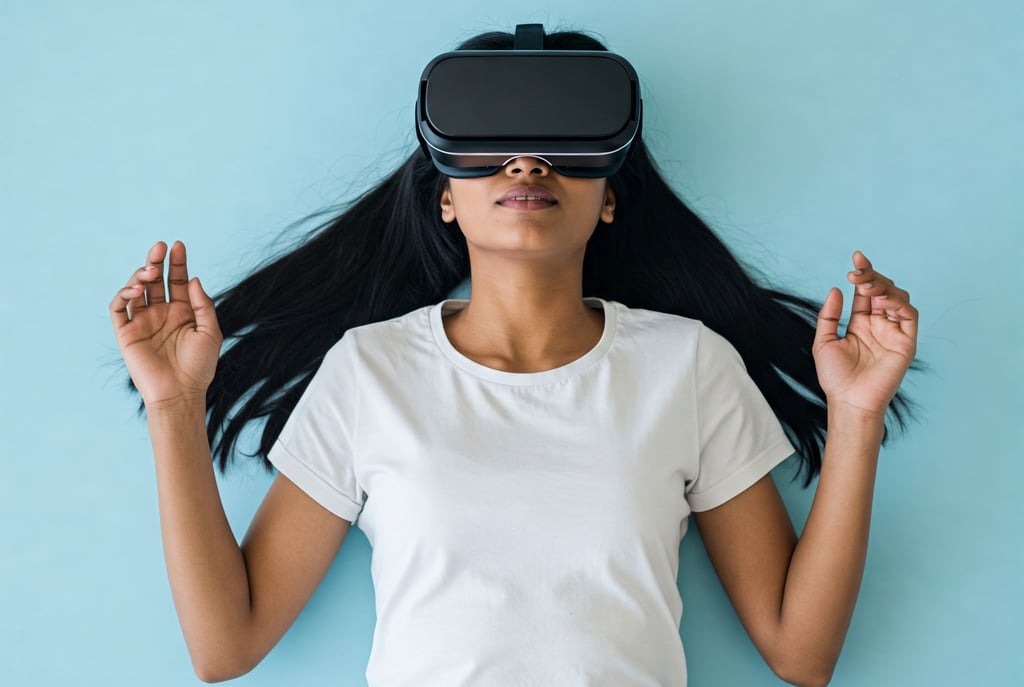Virtual Reality in ESWL: A Novel Approach to Pain Management
Virtual Reality in ESWL: A Novel Approach to Pain Management. Article exploring the use of virtual reality as a distraction tool for shockwave lithotripsy treatment.
2/15/20253 min read


Extracorporeal shock wave lithotripsy (ESWL) is a well-established treatment for kidney and ureteric stone disease, employing high-energy shock waves to fragment stones into smaller pieces for passage through the urinary tract. This article explores the application of virtual reality (VR) for pain management during ESWL.
Pain during ESWL procedures
Pain during ESWL arises from the shock waves, causing discomfort in the flank, back, or pelvis (for ureteric stones). Pain intensity varies considerably among individuals, likely influenced by factors such as stone size and location, individual pain tolerance, and procedure-related anxiety.
Pain can lead to several negative consequences:
* Reduced patient compliance: Pain can hinder patients' ability to remain still, crucial for effective stone fragmentation. Movement can misdirect shock waves, reducing efficacy and potentially increasing the number of treatments required.
* Increased anxiety: Anticipation and experience of pain can elevate anxiety, further impacting the patient's experience and potentially exacerbating pain perception.
* Suboptimal treatment outcomes: Pain can result in suboptimal stone fragmentation, necessitating additional procedures or alternative treatments, such as ureteroscopy or percutaneous nephrolithotomy.
Traditional pain management during ESWL includes medications like diclofenac suppositories, short-acting opioid analgesics, and smooth muscle relaxants such as tamsulosin. Analgesics are often administered before and/or during the procedure.
The Emergence of Virtual Reality (VR)
VR has emerged as a promising non-pharmacological approach to pain management. By immersing individuals in a computer-generated environment, VR offers a compelling sensory experience that can effectively distract patients from pain and anxiety.
Two randomized controlled trials (RCTs) have investigated the acceptability of VR during ESWL. Candela et al. assessed the feasibility and effectiveness of the HypnoVR® device for pain and anxiety management during ESWL. 30 patients with upper urinary tract stones were offered VR during their procedure. Results showed the device was safe and well- tolerated, with only one patient experiencing mild side effects. Pain and anxiety levels were significantly lower post-procedure. The study concluded that HypnoVR® is a clinically feasible and safe tool for pain and anxiety management during ESWL, warranting further comparative studies.
In a subsequent larger RCT, Weynants et al. used the Oncomfort Sedakit VR device (now part of HypnoVR®), immersing patients in an underwater environment following a whale. Patients undergoing ESWL with VR experienced less pain despite receiving significantly higher energy delivery to their stones via more powerful shockwaves. Neither study demonstrated a significant improvement in clinical success of stone clearance.
Practical Experience of VR in ESWL sessions
At University Hospitals Birmingham NHS Foundation Trust, we have implemented VR for ESWL using commercially available, off-the-shelf technology (Meta Quest 3). We tested various meditation software options available from the Meta Horizon Store. Patients receive diclofenac 100mg PR prior to ESWL. After fluoroscopic stone targeting, the VR headset is fitted while the patient lies supine on the ESWL table.
Software selection proved challenging. Most VR environments are designed for seated or standing use, while ESWL requires a supine position. Identifying a stationary, engaging, and immersive environment that avoids motion sickness and involuntary movements was an unexpected hurdle.
Our early experience mirrors Weynants’ findings, showing that patients generally tolerate higher total energy with lower perceived pain. This effect is particularly noticeable in patients undergoing repeat ESWL sessions, who were able to compare experiences with and without the VR device.
You can find out more about the experience of our experience of using virutal reality in this itvNEWS report.
Expanding VR Applications in Urology
VR has potential for various other urological applications, particularly in patient distraction and pain management:
Minimally invasive procedures: VR can distract patients during procedures like flexible cystoscopy, 11 prostate biopsies, and potentially all minimally invasive surgical therapies under local anaesthesia.
Pelvic floor muscle training: VR can provide immersive biofeedback, enhancing patient engagement and effectiveness.
* Preoperative anxiety reduction: VR can alleviate preoperative anxiety by immersing patients in calming environments.
* Postoperative pain management: VR can manage postoperative pain and discomfort, potentially reducing analgesic requirements.
Future Directions
While initial findings are promising, further research, including multi-center studies, is needed. Given the heterogeneity of VR headsets and software, research should focus on identifying the most effective content and delivery methods for patient distraction. Cost- effectiveness evaluations compared to traditional pain management are also crucial to determine clinical and economic benefits beyond improved patient experience.
Conclusion
VR shows significant promise as a novel approach to pain management and distraction during ESWL. By providing a captivating and immersive experience, VR can effectively reduce pain and anxiety during the procedure.
Published: 15/2/2025
Mr Ivo Dukic is an experienced consultant urologist who offers personalised consultations in Birmingham, United Kingdom. Schedule an appointment with him for expert, bespoke advice through his Top Doctors profile or book an appointment through Harborne Hospital, HCA Healthcare, the Priory Hospital, Edgbaston, Circle Health Group or Droitwich Spa, Circle Health.
Ivo Dukic
Contacts
e-mail: admin@ivodukic.co.uk
Telephone number for private patients:
0121 716 9046
(Mondays to Fridays 0800 - 18:00)
For NHS patients seen at University Hospitals Birmingham NHS Hospitals please get in contact on
0121 424 9011
(Mondays to Fridays 0900 - 17:00)
ivodukic.co.uk
© 2025 UrolSurg LTD


